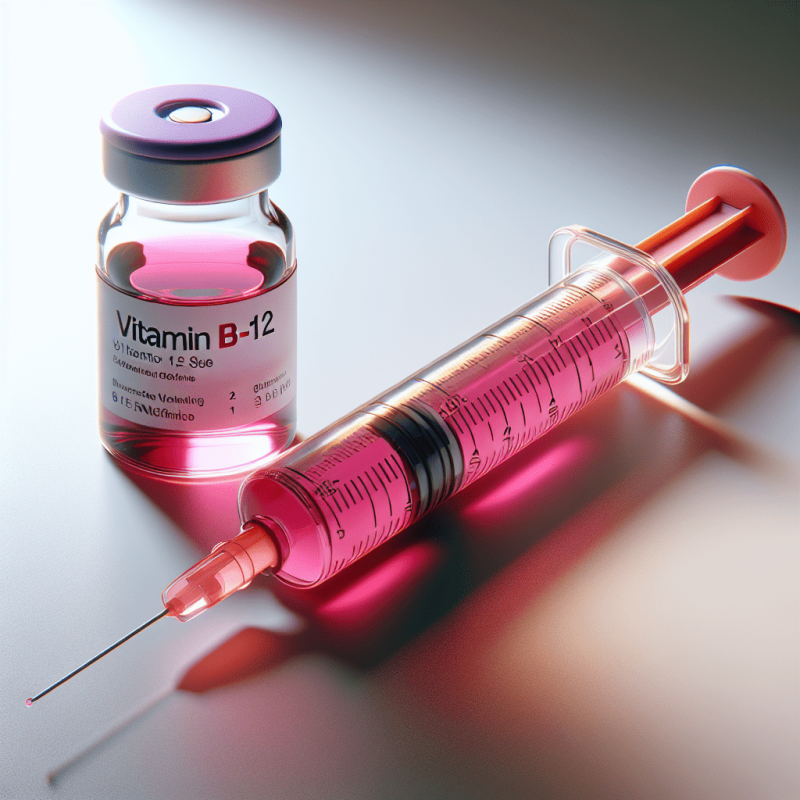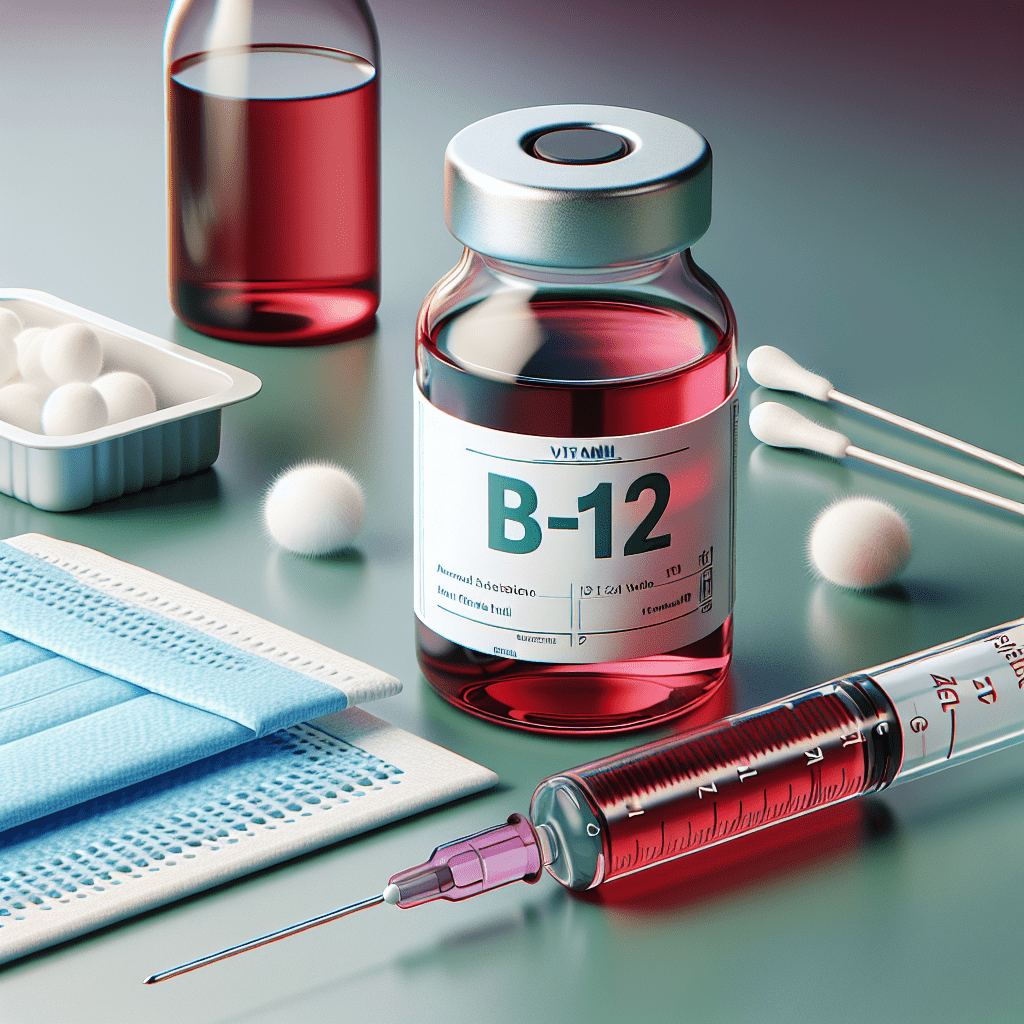

Vitamin B12 is an essential nutrient that plays a crucial role in maintaining overall health. It's vital for the production of red blood cells, DNA synthesis, and the proper functioning of the nervous system.
Despite its importance, many people suffer from B12 deficiency, which can lead to a range of health issues, including fatigue, anemia, and neurological problems. The prevalence of this deficiency is growing, particularly among certain groups such as vegetarians, the elderly, and individuals with certain medical conditions that affect nutrient absorption.
This increasing incidence has led to a heightened awareness of the need for effective solutions to address this deficiency. One such solution is B12 injections. These injections offer a direct and efficient way to boost vitamin levels in the body, bypassing potential absorption issues that can occur with oral supplements.
For those struggling with deficiency, B12 injections can provide a much-needed boost in energy, improve mental clarity, and alleviate symptoms of anemia. For more detailed information on B12 injections, you can visit our B12 Injection page.
Common Causes of B12 Deficiency
B12 deficiency can arise from a variety of causes, each impacting the body's ability to absorb or utilize this essential nutrient.
Insufficient Diet
One of the most common causes is dietary insufficiency, particularly in individuals who follow vegetarian or vegan diets. Since Vitamin B12 is primarily found in animal products such as meat, dairy, and eggs, those who abstain from these foods are at a higher risk of developing a deficiency.
Malabsorption
Another significant cause is malabsorption, which can occur due to various medical conditions. For instance, individuals with pernicious anemia lack intrinsic factor, a protein necessary for B12 absorption in the intestines.
Similarly, gastrointestinal disorders like Crohn's disease, celiac disease, and atrophic gastritis can impair the body's ability to absorb nutrients, including B12. Certain medications, such as proton pump inhibitors and metformin, can also interfere with absorption.
Age
As people age, their ability to absorb B12 diminishes. This is often due to a decrease in stomach acid production, which is necessary for absorption. Additionally, surgical procedures that remove parts of the stomach or intestines can also lead to a deficiency.

Symptoms and Potential Health Impacts
The symptoms of B12 deficiency can be subtle at first but tend to worsen over time if left untreated.
Early signs often include fatigue, weakness, and lightheadedness. As the deficiency progresses, more severe symptoms can develop, such as anemia, which is characterized by a reduced number of red blood cells. This can lead to symptoms like shortness of breath, dizziness, and a rapid heartbeat.
Neurological symptoms are also common and can include numbness or tingling in the hands and feet, difficulty walking, and balance problems.
Cognitive issues such as memory loss, confusion, and difficulty concentrating can also arise.
In severe cases, deficiency can lead to irreversible nerve damage and neurological disorders.
The impact on mental health should not be underestimated. B12 deficiency has been linked to mood disturbances, including depression and irritability. In children, a lack of B12 can result in developmental delays and learning difficulties. Given the wide range of symptoms and potential health impacts, it is essential to diagnose and treat B12 deficiency promptly.
B12 injections offer a reliable and effective solution, providing immediate relief from symptoms and preventing long-term health complications. By understanding the causes and recognizing the symptoms, individuals can take proactive steps to maintain their health and well-being.
How B12 Injections Work in the Body
B12 injections are a highly effective method for delivering this essential nutrient directly into the bloodstream. Unlike oral supplements, which must pass through the digestive system, injections bypass the gastrointestinal tract entirely. This is particularly beneficial for individuals with absorption issues.
When administered, the injection, often given as an intramuscular B12 injection, allows the vitamin to be rapidly absorbed into the bloodstream. This immediate absorption ensures that the body can utilize the vitamin more efficiently, leading to quicker and more noticeable improvements in symptoms. The injection dosage is typically determined by a healthcare provider based on the severity of the deficiency and the individual's specific needs.
The primary function of vitamin B12 in the body is to support the production of red blood cells and maintain proper neurological function. By directly increasing B12 levels, these injections help to alleviate symptoms such as fatigue, weakness, and cognitive difficulties. Additionally, the injections can improve overall energy levels, enhance mood, and support a healthy immune system. This makes them an excellent option for those looking to address B12 deficiency effectively and efficiently.
Advantages Over Oral Supplements
B12 injections offer several advantages over oral supplements, making them a preferred choice for many individuals dealing with deficiency.
One of the most significant benefits is the higher absorption rate. Oral supplements must be broken down in the digestive system, where various factors can impede absorption. By contrast, injections deliver the vitamin directly into the bloodstream, ensuring maximum absorption and effectiveness.
Another advantage is the speed at which injections can alleviate symptoms. Because the vitamin is immediately available to the body, individuals often experience rapid improvements in energy levels, mental clarity, and overall well-being. This is particularly beneficial for those suffering from severe deficiency symptoms, such as anemia or neurological issues.
B12 injections also offer a more controlled and precise dosage. Healthcare providers can tailor the injection dosage to meet the specific needs of the patient, ensuring optimal results. This level of customization is often not possible with oral supplements, which come in standardized doses.
Additionally, injections can be administered less frequently than oral supplements. Depending on the individual's needs, injection frequency can range from weekly to monthly, making it a more convenient option for those with busy lifestyles. This reduced frequency can also lower the overall injection cost over time. For those struggling with deficiency, B12 injections can be a game-changer, improving health and quality of life.

Who Should Consider B12 Injections?
B12 injections are particularly beneficial for individuals who are at a higher risk of B12 deficiency or those who have difficulty absorbing the vitamin through dietary sources. Let's explore.
Those with Dietary Limitations
Vegetarians and vegans, for instance, often struggle to get enough B12 from their diet alone, as this vitamin is predominantly found in animal products. For these individuals, a vitamin shot can be an effective way to ensure adequate intake.
The Elderly
Elderly individuals are another group that can benefit significantly from vitamin injections. As people age, their ability to absorb B12 from food diminishes, often due to decreased stomach acid production. Injections can help maintain optimal levels of this essential nutrient, thereby preventing symptoms like fatigue and cognitive decline.
Those with Digestive Conditions
Individuals with certain medical conditions, such as pernicious anemia, Crohn's disease, and celiac disease, may also find B12 injections to be a more effective solution. These conditions can impair the body's ability to absorb B12, making oral supplements less effective. In such cases, injection therapy can provide a direct and efficient means of boosting vitamin levels.
Consulting with a healthcare provider can help you determine if B12 injections are the right choice for you based on individual health needs and lifestyle factors.
Possible Side Effects and Safety Guidelines
While B12 injections are generally considered safe, it is essential to be aware of potential side effects and follow safety guidelines to ensure optimal results.
Common side effects are usually mild and may include:
-
Pain or redness at the injection site,
-
Mild diarrhea,
-
and itching.
These symptoms typically resolve on their own and do not require medical intervention.
In rare cases, individuals may experience more severe side effects, such as allergic reactions. Symptoms of an allergic reaction can include swelling, dizziness, and difficulty breathing. If any of these symptoms occur, seek medical attention immediately.
It's also important to discuss any pre-existing medical conditions or allergies with a healthcare provider before starting injection therapy. Proper B12 injection administration is key to minimizing side effects and ensuring effectiveness.
A healthcare provider can demonstrate the correct technique and provide guidance on how to administer the injections safely at home if necessary. Monitoring injection dosage and frequency is important. Overuse or incorrect dosing can lead to complications, so follow the prescribed regimen. Regular follow-up appointments with a healthcare provider can track progress and make any necessary adjustments to the treatment plan.
Conclusion
B12 injections offer a highly effective solution for addressing B12 deficiency, a condition that can lead to a range of health issues if left untreated. The importance of this vitamin for overall health cannot be overstated, as it plays a crucial role in red blood cell production, DNA synthesis, and neurological function.
By understanding the causes, benefits, and practical considerations, individuals can make informed decisions about their health. If you suspect you may be deficient in B12, don't hesitate to consult with a healthcare provider to explore the potential benefits of injections. Taking proactive steps to address B12 deficiency can lead to significant improvements in energy, mental clarity, and overall quality of life.
Back to Blog post list

